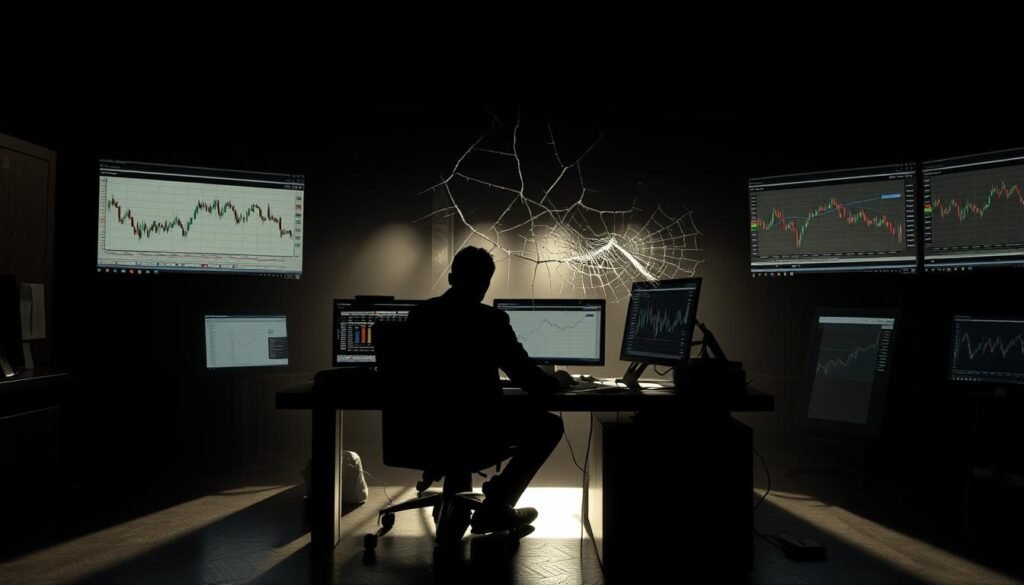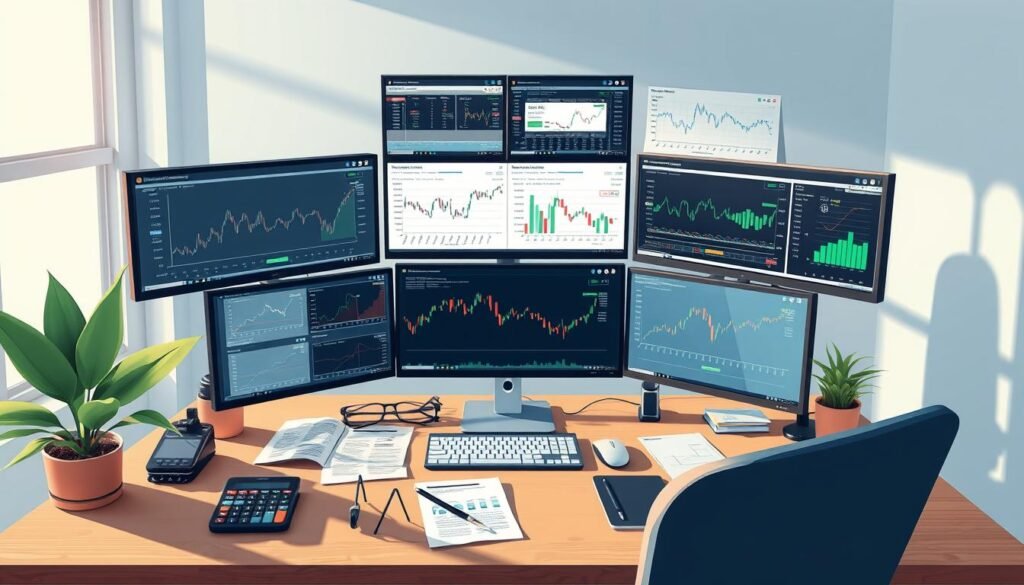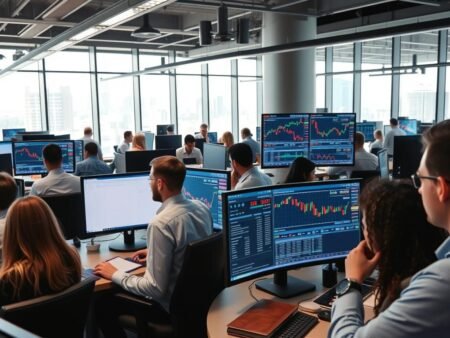The world of proprietary trading is full of risks and chances. Traders face a big question: What if you fail a prop firm evaluation? The thought of dealing with the consequences is scary, but it’s a part of the journey for many.
This article aims to clear up what happens after failing such a test. It’s here to guide those who want to bounce back from a setback.
Starting the evaluation process is a big challenge. But failing doesn’t mean it’s over. This section talks about the effects of failure on your trading career. It aims to ease worries and offer a clear path forward.
We’ll dive deep into the world of prop trading evaluation consequences. We’ll show that failing doesn’t end your trading journey. Instead, it opens new doors. For those wondering, ‘What happens if you fail a prop firm evaluation?’, the answer is here.
Key Takeaways
- Understanding the range of consequences following a failed prop firm evaluation.
- Insight into both immediate impacts and long-term repercussions for traders.
- Clarification of the steps to take and options available after failing an evaluation.
- Anticipating the emotional and psychological responses to evaluation outcomes.
- Strengthening resilience by learning from failed attempts for future success in prop trading.
Understanding Prop Trading Firm Evaluations
In the fast-paced world of proprietary trading, thorough evaluations are key. They help decide if traders can handle big financial risks and rewards. These evaluations keep firms strict in their ways, leading to success and smart risk management.
The Evaluation Process Explained
The evaluation starts with a simulated trading environment. Traders face market conditions like real ones. This tests their adaptability, decision-making, and strategy under pressure.
It’s not just about making money. It’s about doing it sustainably and managing risks well.
Key Metrics Used During Evaluations
Prop trading firms use several key metrics to check a trader’s performance. These include profit and loss ratios, maximum drawdown, and trading consistency. These help measure a trader’s efficiency and risk-taking, key for success.
Profit and Loss Ratios: This shows a trader’s earning potential by comparing gains to losses.
Maximum Drawdown: It measures the biggest loss in capital, showing the risk of a trader’s strategy.
Consistency: Regular checks ensure traders can make profitable trades and do it well over time.
The Importance of Performance Benchmarks
Performance Benchmarks are vital. They set financial goals and risk limits for traders. These benchmarks help evaluate traders against a standard, ensuring the firm’s performance is worth the capital given.
These standards are important for two reasons. They give traders clear goals and alert the firm to any issues in trading. This helps both the trader’s growth and the protection of capital.
Immediate Consequences of Failing a Prop Firm Evaluation
When a trader fails a prop trading firm evaluation, the effects are quick and serious. They can hurt many parts of a trader’s career. It’s key for traders to know these early effects.
Potential Financial Implications
Failing evaluations can lead to financial losses. Many prop trading firms ask for a payment to start trading. This money might not be fully returned. Such losses can make it hard to invest in other trading chances.
Access to Trading Capital
Prop trading firms offer big trading capital. But, failing an evaluation means losing this access. This makes it tough to do big trades.
Communication and Feedback from the Prop Firm
How prop firms give feedback after an evaluation can differ a lot. They usually give a detailed review of what went wrong. This feedback is important for improving. But, the type of feedback can really affect a trader’s mood and future performance.
| Aspect | Impact |
|---|---|
| Financial Loss | Potential loss of initial investment with little to no refund |
| Trading Capital | Limited access to firm’s capital, restricting trade size and potential profit |
| Feedback Quality | Varies from supportive to critical, directly affects trader’s confidence and future approach |
The effects of failing trader evaluations go beyond just work issues. They also affect money and mental readiness. So, traders should be well-prepared and know what might happen.
Long-Term Repercussions of a Failed Evaluation
When a trader fails a prop trading firm evaluation, the long-term impact on traders goes beyond just money. It can affect many parts of a trader’s career. Knowing these effects helps prepare for and lessen the damage.
Traders’ professional reputation can suffer a big blow. This loss of trust from others can make it hard to find new partners or funding. Also, overcoming the emotional hurdle of failure is tough. It often requires a strong mental adjustment and a fresh look at trading plans.
“Failing in a trading evaluation doesn’t just test financial resilience but also emotional and professional endurance in facing the trading world anew.”
Re-evaluating trading strategies can take time and resources. This might not always be easy to find, making recovery slower. Here’s a look at how different strategies can help after a trading evaluation failure.
| Strategy | Time to Implement | Effectiveness |
|---|---|---|
| Comprehensive Market Analysis | 3-6 months | High |
| Mentorship and Continual Learning | 1-2 months | Medium |
| Psychological Counseling | 1 month | Medium |
The table shows that each strategy has its own timeline and success rate. But using them together might be the best way to deal with the long-term impact on traders. This approach can help not just recover from trading career setbacks but also improve a trader’s skills. This makes them stronger for future evaluations.
How Prop Firms Handle Evaluation Failures
When a trader fails an evaluation, prop firms have clear steps to follow. They aim for fairness and growth. This part looks at how firms handle these situations, including the prop firm evaluation review process and chances for retests.
The Prop Firm Evaluation Review Process
After a trader fails, firms start with a detailed review. They check the trader’s strategies, risk handling, and decisions. The goal is to find out why they failed and how to do better next time.
This feedback is key for traders. It helps them understand their performance and how to improve.
Possible Retest or Second Chance Policies
After reviewing, traders might get a retest or a second chance. This depends on their initial performance and the firm’s rules. Retest policies after failing evaluations differ among firms.
Some offer immediate retests if the trader was close. Others might need a wait or more training first.
- Immediate retest for marginally missed metrics
- Structured reevaluation after additional training sessions
- Case-dependent retest opportunities
Case-by-Case Considerations in Evaluations
Decisions on retests and reviews are not the same for everyone. They depend on the trader’s situation. This includes how badly they failed, their trading strategies, and past performances.
By looking at each case individually, firms make fair decisions. This ensures only the best traders get to work with big amounts of money.
This careful yet flexible way keeps trading standards high. It makes sure only the most skilled and adaptable traders get to work with big funds.
Emotional and Psychological Effects of Failing
Failing a prop trading firm evaluation can deeply influence a trader’s emotional and mental health. This section explores the common reactions and effective strategies for Coping with trading failure.

One significant psychological effect of evaluation failure is a deep sense of disappointment. This often comes with self-doubt, questioning one’s trading skills and decision-making abilities. It’s important to address these feelings constructively for recovery and future success.
“Understanding that failures are merely stepping stones in learning helps alleviate the harsh self-judgment that comes with trading failures.”
Moreover, persistent negative emotions can lead to long-term discouragement, affecting trading performance. Here are a few steps for traders to manage these stresses:
- Acceptance and Emotional Acknowledgment: Recognize and accept your emotions as a natural response to disappointment.
- Focused Reflection: Assess what went wrong without dwelling on it negatively. Use it as a learning platform.
- Setting Realistic Goals: Redefine your trading goals to ensure they are achievable and aligned with your current skill level.
- Seek Professional Guidance: Sometimes, consulting a psychologist or a trading coach can provide insights into effective coping strategies.
By implementing these strategies, traders can lessen the psychological effects of evaluation failure. This paves the way for improved mental resilience and better preparedness for future trading challenges.
Structuring a Plan to Recover from a Failed Evaluation
Recovering from failing a prop firm evaluation means more than just changing your trading strategies. It’s about a complete change in how you view the financial markets. Whether it’s your first time or you’ve faced many setbacks, knowing how to bounce back is key to success.
First, you need to deeply analyze what went wrong. This self-check helps find both technical and emotional issues that might have led to your failure.
Assessing What Went Wrong
Look back at trades that didn’t do well and see what went wrong. Was it a lack of knowledge, poor risk management, or emotional decisions? Once you know these, you can start making a plan to improve.
Developing a Trading Improvement Strategy
Creating a plan to get better means more than just small changes. It’s about coming up with new strategies that fit the market and your trading style. This might mean better risk management, new market tools, or different trading times.
Utilizing Resources and Tools for Better Performance
Today, using technology can really help. Use software for analysis, attend webinars, and try simulation tools. These tools are key to improving your trading skills.
Learning to recover from a failed evaluation takes time, effort, and a desire to keep learning. With a solid plan and the right tools, you can improve and do better next time.
How to Recover from Failing a Prop Firm Evaluation
Recovering from a failed prop firm evaluation needs quick and smart actions. Focus on recovery strategies for failing traders and improving trading post-evaluation failure. A good recovery plan helps you stay strong mentally and improve your skills through practice and learning.
Learning from failure is a milestone in any trader’s career. It is the resilience and willingness to improve that distinguishes successful traders from the rest.
Mentorship is key in recovering from failing as a trader. A good mentor offers technical advice and emotional support. They help you deal with feelings of disappointment and find areas to improve. Together, you work on specific skills and strategies to grow.
- Analysis of previous trading patterns and mistakes
- Setting realistic goals for trading practice
- Regular performance reviews with mentors and peers
Practicing regularly is a big part of recovery strategies for failing traders. This means doing mock trading or paper trading to improve without risk. Also, going back to educational materials can really help in improving trading post-evaluation failure. This might include taking more advanced courses, attending webinars, and joining trader forums.
Setting clear goals and keeping a log of your trades helps you get better. Review each trading session carefully. Look at the results, but also how you made decisions and managed risks.
- Integrate advanced risk management techniques into daily trading routines.
- Enhance technical analysis skills through continuous education and application.
- Develop a resilient trading psyche to manage emotional swings effectively.
Using these strategies helps you bounce back from failing a prop firm evaluation. It also makes you stronger for future challenges.
Prop Trading Firm Evaluation Failure Outcomes
Prop trading has its ups and downs. A big down is failing an evaluation. This can change a trader’s career path, making them think about other trading jobs.
Impact on Career Prospects in Prop Trading
Failing an evaluation can hurt your career. It might mean fewer chances at the firm. You could lose your trading rights or miss out on growth chances. This shows how important it is to do well and keep getting better.
Restrictions on Future Evaluation Attempts
Prop trading firms have strict rules about trying again. After failing, you might have to wait a long time to try again. Or, you might not be allowed to try again at all. These rules highlight the high standards and the need to learn from mistakes.
Alternative Paths for Aspiring Prop Traders
If you fail an evaluation, don’t give up. There are other trading jobs you can try. You could be an independent trader, a financial analyst, or teach trading. Learning new skills and exploring different areas of finance can lead to new career paths.
It’s important to understand what happens after failing an evaluation. You can work on improving for the next try or look into other trading jobs. There are many ways to keep moving forward in your trading career, even after facing setbacks.
Avoiding Failure in Future Prop Firm Evaluations
Doing well in prop firm evaluations can boost your trading career and lower the chance of setbacks. Being well-prepared and meeting performance standards are key. This part talks about ways to avoid failure in prop firm evaluations. It helps you get ready for your trading journey.
- Comprehensive Review of Evaluation Protocols: Learn the specific rules and what the prop firm values.
- Simulation and Practice Trading: Practice a lot in a simulated environment to feel confident and find areas to get better.
- Stress Management Techniques: Since trading evaluations are stressful, learning to manage stress can really help your performance.
- Feedback Incorporation: Use feedback from past evaluations or mentors to improve your strategies and fix past mistakes.
These steps help you understand the evaluation process better. They give you the tools to do well. Below is a table with key elements for success and common mistakes to avoid. It shows how to prepare and do your best.
| Element for Success | Description | Common Pitfalls |
|---|---|---|
| Understanding of Evaluation Criteria | Know what evaluators look for during trading sessions. | Not understanding the goals and benchmarks. |
| Practice and Simulation | Practice often in conditions like the evaluation setting. | Not practicing enough or preparing well. |
| Emotional Resilience | Learn to handle stress during important evaluations. | Letting emotions control your trading decisions. |
| Feedback Utilization | Use feedback to improve your trading methods. | Ignoring feedback and making the same mistakes again. |
Using these strategies can help you avoid failure in prop firm evaluations. It makes you a disciplined and insightful trader. Every evaluation is a chance to learn and get better. Take it as an opportunity to grow and succeed in prop trading.
Tips for Passing Prop Firm Evaluations
To succeed in prop firm evaluations, you need a solid plan, a deep understanding of risk, and emotional stability. We’ll share key tips and strategies to boost your chances of passing these tough tests.
Detailed Preparation and Practice
Being well-prepared is key to success in prop firm evaluations. Traders should practice in conditions similar to real trading. Use demo accounts that match the prop firm’s platforms and practice with the firm’s market focus.
Good preparation helps you get familiar with the financial instruments you’ll trade. This boosts your confidence and skill.
Risk Management Best Practices
Knowing how to manage risk is crucial for passing a prop firm evaluation. Traders must show they can make profits while keeping losses low. Key strategies include setting stop-loss orders, controlling position sizes, and sticking to a trading plan.
Mastering Trading Psychology
Trading psychology is what sets successful traders apart. It’s important to handle emotions like fear, greed, and frustration well. Being mentally strong helps keep focus and make clear decisions, even when it’s tough.

| Practice Area | Benefits | Tips |
|---|---|---|
| Simulated Trading | Mirrors real-world trading environments | Use demo accounts that reflect actual trading platforms |
| Risk Management | Prevents significant losses | Establish strict rules for stop-loss and position sizing |
| Psychological Conditioning | Enhances decision-making under stress | Regularly review trading decisions to build emotional control |
Common Mistakes to Avoid During Prop Firm Evaluations
Prop trading firms are complex and require skill. The importance of trading discipline is huge. Traders must avoid mistakes in prop firm evaluations to succeed.
Overtrading and emotional trading are big mistakes. Traders need to stick to their strategies and manage their emotions. Every decision should be made with a clear head, not emotions.
Following prop firm rules is also key. These rules test a trader’s discipline and risk management. Ignoring them can harm your chances.
Not having a trading plan is another mistake. A good plan helps traders in tough markets. Learn more about these topics here.
Overtrading and Managing Emotions
To avoid overtrading, set clear trade rules. Stick to them, no matter what the market does. Emotional trading can lead to too many bad trades.
Ignoring Prop Firm Rules and Guidelines
Every prop firm has its own rules. These rules check if a trader is ready for big money. Breaking these rules can hurt your chances and show you’re not professional.
Lack of a Consistent Trading Plan
A good trading plan is essential. It should match the prop firm’s goals. This plan is strong against market changes but also flexible for adjustments.
Success Stories: Bouncing Back from an Evaluation Failure
Every trader’s career has ups and downs. But not everyone turns a low into a high. Trading success stories post-failure show how some traders bounced back after hitting a roadblock. They highlight the journeys of those who overcame initial disappointments and found success.
Success in trading is not always easy. It often means learning from mistakes and adjusting strategies. The key is to see failure as a chance to grow, not as a limit to your abilities.
- Adapting strategies after feedback and failures.
- Incorporating advanced risk management techniques.
- Focusing on continuous education and skills upgrade.
These stories motivate and guide struggling traders. They show how resilience can lead to success. Successful traders teach us that setbacks can be opportunities for growth.
“Failure is only the opportunity to begin again more intelligently.” – A quote many successful traders resonate with after overcoming initial failures.
Community and mentoring play a big role in trading success stories post-failure. Support from others is crucial. Whether online or in-person, networking boosts confidence and knowledge.
In conclusion, these stories show the power of resilience in prop trading careers. They prove that success comes from learning to bounce back, not from avoiding failure.
Leveraging Community Support and Forums
Prop traders often face tough challenges in the trading world. Seeking help from others and joining trading forums can be very helpful. These places offer emotional support and practical advice that are key for growing and bouncing back after tough times.
Finding Peer Guidance and Advice
Trading forums are great for getting advice from others who trade. Traders share their stories, strategies, and tips. This helps others learn from their mistakes and find better ways to trade.
Getting support from those who understand can really boost your mood and improve your trading skills.
Networking with Successful Prop Traders
Forums are also a place to meet successful traders. These connections can lead to mentorship. This means you can learn from the top traders in the field.
This mentorship can help you grow professionally and do better in future evaluations.
Utilizing Community Resources for Learning and Growth
Trading communities offer many resources like webinars and live trading sessions. These help you learn and grow. The support you get goes beyond just feeling better, it helps you learn new things and try out different trading methods.
Redefining Goals After an Evaluation Setback
Getting a setback in a prop trading firm evaluation is a big moment for any trader. It’s a chance to set new trading goals and adapt after trading evaluation failure. This helps not just to get over the disappointment but also builds a strong trading strategy and personal growth.
Changing your trading approach after an evaluation means looking at your strategies again. You also need to set goals that are realistic and can be reached. Here’s how to change your trading goals and strategies to match your dreams and the market:
- Look closely at the feedback from the evaluation to find out where you need to improve.
- Talk to mentors or experienced traders for tips on good trading strategies and managing risks.
- Make short-term, easy-to-measure goals to help you get better at trading.
- Keep checking and changing your trading plans as the market and your skills change.
This change in goals is not just about getting back on track. It’s about making your trading better and taking your career to new levels.
See every failure as a chance to improve your strategies and get better at meeting the tough challenges of trading.
But it’s not just about thinking and planning. Adapting after trading evaluation failure also means having a mindset that’s always learning and can bounce back. This mindset makes every setback a step towards bigger success.
In the end, setting new trading goals and adjusting after a failure is more than just changing numbers or plans. It’s about becoming a trader who is flexible, well-informed, and can bounce back. This is what makes successful traders stand out.
What Happens If You Fail a Prop Firm Evaluation?
The repercussions of failing a prop trading firm evaluation can be big. It’s important to understand them clearly and act proactively. Not passing might mean financial penalties or losing access to trading funds. But, it also opens up a chance for growth and learning.
Looking back at failing an evaluation is not just about admitting mistakes. It’s about finding new ways to succeed in the fast-paced world of proprietary trading.
When you fail an evaluation, it’s a chance to really think about your trading. You should look at what you do well and what you need to work on. The feedback from the prop firm is very valuable here.
These insights can help you create a stronger trading plan. They can also improve your risk management and make you more resilient in the market.
Today’s challenges can lead to tomorrow’s successes. The smart trader learns from their mistakes and moves forward. The path after failing a prop trading firm evaluation is clear.
It’s time to rethink your strategy, improve your skills, and take risks wisely. These steps can help you become a better, more confident trader in the competitive world of prop trading.












